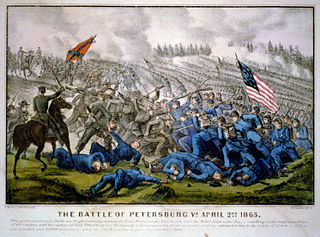
The Third Battle of Petersburg, also known as the Breakthrough at Petersburg or the Fall of Petersburg, was fought on April 2, 1865, south and southwest Virginia in the area of Petersburg, Virginia, at the end of the 292-day Richmond–Petersburg Campaign and in the beginning stage of the Appomattox Campaign near the conclusion of the American Civil War. The Union Army under the overall command of General-in-Chief Lieutenant General Ulysses S. Grant, launched an assault on General Robert E. Lee's Confederate Army of Northern Virginia's Petersburg, Virginia, trenches and fortifications after the Union victory at the Battle of Five Forks on April 1, 1865. As a result of that battle the Confederate right flank and rear were exposed. The remaining supply lines were cut and the Confederate defenders were reduced by over 10,000 men killed, wounded, taken prisoner or in flight.
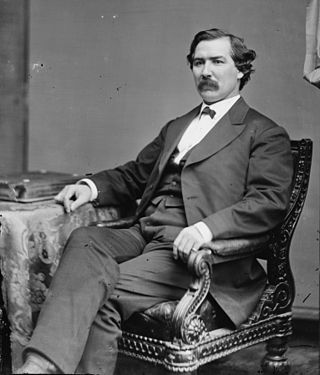
Thomas Ward Osborn was a Union Army officer, freedmen bureau official, 1868 Florida Constitutional Convention delegate, state senator, and United States Senator representing Florida.
Henry (Heinrich) Bertram was a German American immigrant and Union Army officer during the American Civil War. He rose to command a brigade in the trans-Mississippi and western theaters of the war, and received an honorary brevet to the rank of brigadier general. After the war, he served one term in the Wisconsin State Assembly, representing southern Dodge County, and was sheriff of Dodge County for two years.

Johnson Hagood was a planter, soldier and military officer in the Confederate States Army during the American Civil War, reaching the rank of brigadier general in the state militia and regular Confederate Army in 1862.

Orville Hungerford was a two-term United States Representative for the 19th District in New York in the mid-19th century. He was also a prominent merchant, banker, industrialist, freemason, philanthropist, and railroad president in Watertown, New York.

Harris Merrill Plaisted was an attorney, politician, and Union Army officer from Maine. As colonel, he commanded the 11th Maine Volunteer Infantry Regiment during the American Civil War. After the war, he served as Maine Attorney General, a U.S. Congressman, and the 38th Governor of Maine.

Albert Duane Shaw was an American government official and politician from New York. A Union Army veteran of the American Civil War, he was most notable for his service as Commander-in-Chief of the Grand Army of the Republic and a U.S. Representative from New York's 24th congressional district.

George Morton Randall was a major general in the United States Army, noted for his service in the American Civil War and Indian Wars. He was born in Conneaut, Ohio, the son of Brewster Randall (1807–1880) and Harriet Eliza Fifield Randall (1819–1878).

Charles Rice Gill was an American lawyer, politician, and Union Army officer in the American Civil War. He was the 9th Attorney General of Wisconsin and represented northern Jefferson County in the Wisconsin State Senate for the 1860 and 1861 sessions. He also briefly served as U.S. Commissioner of Pensions under President Ulysses S. Grant.

Isaac Swartwood Catlin was an American lawyer and a decorated officer in the American Civil War. A native of Owego, New York, he studied law in New York City before returning to Owego to begin his career. He joined the Union Army in the first days of the Civil War and rose to commander of the 109th New York Volunteer Infantry Regiment. Severely wounded during the Battle of the Crater, he remained on the field and led his regiment until he was injured a second time, resulting in the loss of his leg. For this action he was awarded the U.S. military's highest decoration, the Medal of Honor. After the war, he moved to Brooklyn and established himself as a criminal defense lawyer and district attorney. He was politically active but lost a race for Mayor of Brooklyn and declined several other opportunities to run for higher offices.
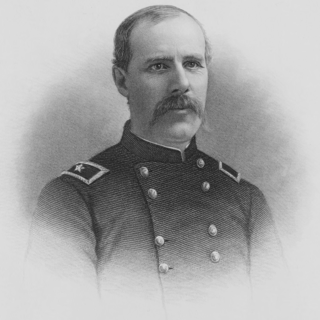
Edward Francis Winslow was an American soldier, railroad executive, and merchant who served as colonel and brigadier general of the 4th Iowa Cavalry Regiment during the American Civil War from 1864 to 1865. Winslow participated in numerous Union Army campaigns of the Army of the Tennessee, including the Siege of Vicksburg.
Perley Keyes was an American politician from New York.
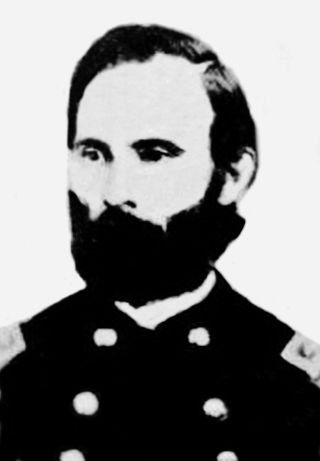
James Bintliff was a colonel in the Union Army during the American Civil War. He briefly commanded brigades for three weeks near the end of 1864 and during most of the crucial month of April 1865. In 1866, he was nominated for appointment as and confirmed as a brevet brigadier general of volunteers in recognition of his conspicuous gallantry during the Third Battle of Petersburg on the final day of the Siege of Petersburg, April 2, 1865. On January 13, 1866, President Andrew Johnson nominated Bintliff for appointment to the grade of brevet brigadier general of volunteers to rank from the final date of the fighting at Petersburg, April 2, 1865. The United States Senate confirmed the appointment on March 12, 1866. In civilian life, Bintliff was one of the founders of The Northwestern Mutual Life Insurance Company. He was editor, publisher and proprietor of three newspapers, one before the Civil War and two after the war. He was a Wisconsin state government official for fourteen years from 1876 to 1891.
Joseph Nelson Garland Whistler was a career United States Army officer. He served in the Mexican–American War and received a brevet appointment for distinguished service in the Battle of Contreras and the Battle of Churubusco. At the beginning of the American Civil War, Whistler was among the U.S. Regular Army officers taken prisoner by Confederates in Texas in April 1861 and paroled but was not exchanged until August 15, 1862. In 1863, he became colonel of the 2nd New York Heavy Artillery Regiment. He received a promotion and four brevet appointments in the regular army for his service during the Overland Campaign, specifically the Battle of North Anna, and the Siege of Petersburg, specifically the Second Battle of Petersburg. He was nominated on January 13, 1866 and confirmed on March 12, 1866 for appointment to the grade of brevet brigadier general of volunteers, to rank from March 13, 1866. He retired in on October 19, 1886 as colonel of the 15th U.S. Infantry Regiment.

Norris M. Winslow was an American banker, merchant and politician based primarily in Watertown, New York, who built almost 100 buildings in the city.
The 19th Mississippi Infantry Regiment an infantry formation of the Confederate States Army during the American Civil War. As part of the Army of Northern Virginia, the 19th Regiment fought in numerous battles of the Eastern Theater. The Regiment was successively commanded by Colonels Christopher Mott, Lucius Lamar, Nathaniel Harris, Thomas Hardin, and Richard Phipps.
Albert A. Solliday was an American dentist, soldier and politician. He was the 24th mayor of Watertown, Wisconsin, and represented Jefferson County in the Wisconsin State Senate from 1892 to 1899.

Pardon Clarence Williams was an American lawyer and judge from New York.

Alfred Collins Markley (1843-1926) was an American brigadier general who served in the American Civil War and the Spanish–American War. He was known for commanding the 24th Infantry Regiment during the Battle of San Juan Hill and the Siege of Santiago.
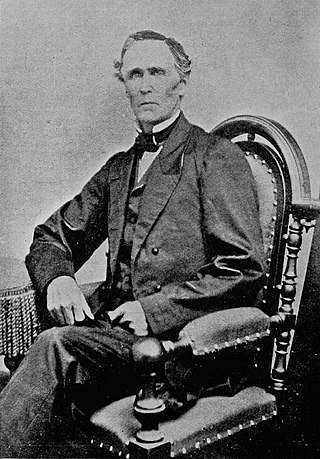
John Winslow was an American soldier and politician.


















